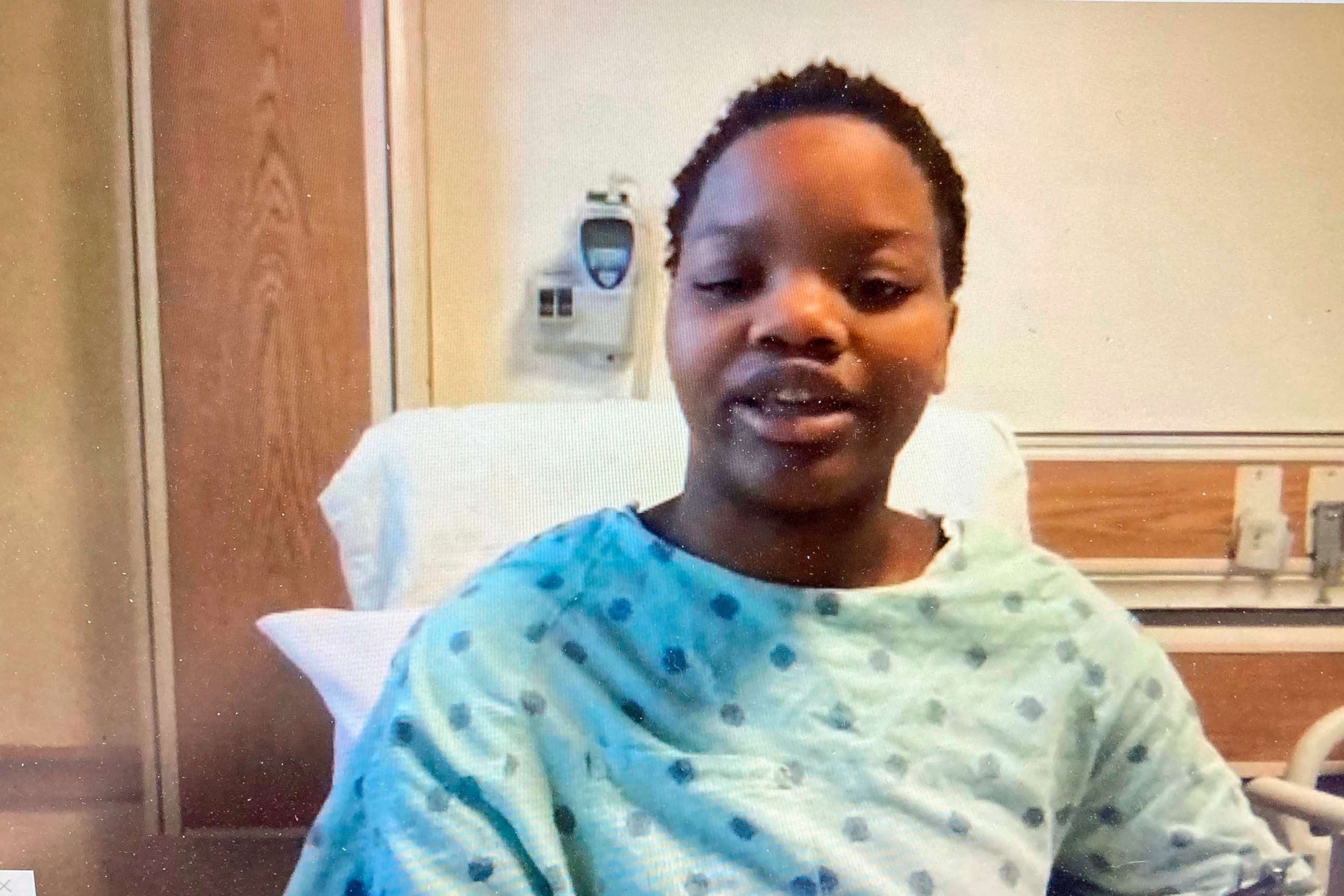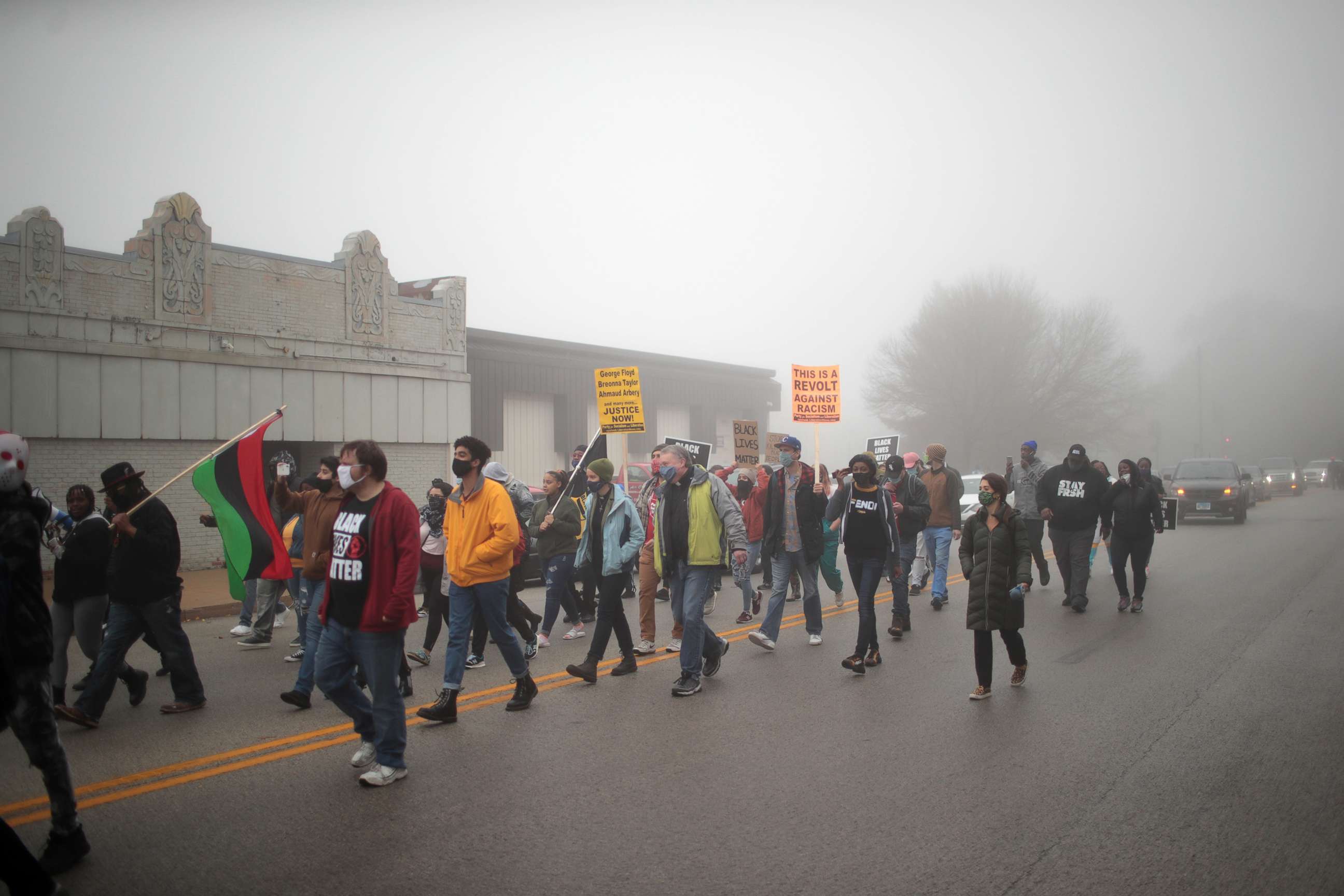Tafara Williams says she and boyfriend had their hands up when police opened fire
An officer fired multiple times into a car Williams was driving.
Confined to a hospital bed, bandages covering her bullet wounds, 20-year-old Tafara Williams spoke publicly for the first time on Tuesday, claiming the Waukegan, Illinois, police officer who shot her and killed the 19-year-old father of her baby opened fire when they both had their hands up.
Williams broke her silence during a news conference with the family of her dead boyfriend, Marcellis Stinnette, and her lawyers, who said they are still waiting to view police body camera footage of the shooting that unfolded just before midnight on Oct. 20 in the suburban Chicago city.
"That day, I lost the love of my life and the father of my 7-month-old son," an emotional Williams said in the Zoom video conference from her hospital room. "[The baby] is the only thing I have left of Marcellis."
She said the fatal confrontation began when she and Stinnette were sitting in her car outside her home smoking and an officer pulled up behind her parked car.
"He didn't turn on his lights or siren," she said.
She said that when the officer got out of his patrol car, she rolled down her window and turned on her car's interior lights "so the officer could see I had no weapons and I wasn't doing anything illegal."

"The officer called Marcellis by name," Williams recalled. "He asked me, 'Was I Tafara?' and told me that I was Marcellis' baby mother. Then he started harassing Marcellis. He stood near the car with his left hand on his gun and he said to Marcellis, 'I know you from jail.'"
Williams said she asked the officer if they were free to leave and if they were under arrest.
"The officer took a few steps away from the car and got on his cellphone. I drove away very slowly because I was scared to get out of the car," she said, adding that the officer did not follow them.
She said she drove to nearby Martin Luther King Boulevard and that it seemed like "another officer was there waiting for us."
"There was a crash and I lost control. The officer was shooting at us. The car ended up slamming into a building," she said. "I kept screaming, 'I don't have a gun.' But he kept shooting. He told me to get out of the car. I had my hands up and I couldn't move because I had been shot. Marcellis had his hands up. I kept asking him why, why he was shooting."
She said she noticed Stinnette was shaking uncontrollably as more officers arrived and were pointing their guns at them.
"My blood was gushing out on my body. The officers started yelling. They wouldn't give us an ambulance until we got out of the car," she said. 'When I moved, blood seemed to pour out of my body on the floor of the car, on the ground, everywhere."
She said she could still hear Stinnette breathing and that she told the officers on the scene, "Please don't shoot. I have a baby, we have a baby. We don't want to die."
As an officer dragged her away from Stinnette, she begged them to take him to the hospital first, Williams said.

"They ignored me," Williams went on. "They laid Marcellis on the ground and covered him up with a blanket while he was still breathing. I know he was still alive. He was still breathing and they took me away ... and allowed him to die."
Waukegan police officials had no immediate response to Williams' version of what transpired.
An independent investigation by the Illinois State Police and the FBI is ongoing. Waukegan Police Chief Wayne Walles acted swiftly in terminating the officer involved in the shooting after finding he allegedly violated numerous department policies and procedures when he unleashed a barrage of gunfire on the unarmed young Black couple.
Walles has declined to elaborate on the violations allegedly made by the five-year veteran of the force, who authorities described as Hispanic.
Police officials initially said the now-former officer, whose name has not been released, claimed he opened fire out of fear for his life after Williams' car reversed toward him as he approached it.
Williams did not say anything about putting her car in reverse when the shooting erupted, and one of her lawyers, Antonio Romanucci, called the shooting "needless, senseless and should never have happened."
Romanucci accused the officer who initially confronted Williams and Stinnette of "racially profiling." Police officials said that officer is white and also a five-year veteran of the police department.
“We could not be more critical of what this police officer did because what he did was nothing short of a profile. He profiled these poor people because of the color of their skin. That was their crime. They were committing no crime at all," said Romanucci, standing with relatives of both Williams and Stinnette and Black Lives Matter organizers in front of a courthouse in Waukegan.
Cmdr. Edgar Navarro of the Waukegan Police Department said at a news conference on Wednesday that the shooting unfolded just before midnight when another officer initiated an investigation of a "suspicious vehicle." He said the vehicle "fled" when the officer approached it.
Navarro said a second officer spotted the car and pulled it over.
"That officer exited his vehicle and the vehicle that he was investigating began to reverse toward the officer," Navarro alleged. "The officer then pulled out his duty weapon and fired into the vehicle that was reversing. Both occupants were struck."
He said the female driver, Williams, was wounded and the male passenger, Stinnette, was taken to a hospital, where he was pronounced dead.
No weapons were found in the car.
Navarro said the officer who initially approached the car and the officer who opened fire were immediately placed on administrative leave. On Friday, Chief Walles announced that the officer involved in the shooting had been fired.
Williams' parents, Tina Johnson and Trevor Williams, also spoke at the news conference, demanding transparency and accountability on behalf of their daughter and Stinnette.
“I’m here demanding justice to hold these officers accountable for what they did to Marcellis and Tafara," Johnson said. "This happened to my child and her boyfriend this time. But if America doesn’t stop this disease of violence, it could be anyone’s child."
She added that her only daughter was raised in the Baptist church and is the "strongest person I've ever met."
"She loves everybody and has a heart of gold," Johnson said. "She is a good mom and Marcellis was a great father to their baby. He was a gentle soul and I can still see the smile on his face."
Romanucci and civil rights attorney Ben Crump, who is also representing Tafara Williams, said the mayor of Waukegan has assured them that the family will soon be allowed to view police body camera footage of the shooting.
On Sunday, Mayor Sam Cunningham said the city will make the footage available to the Williams and Stinnette families by the end of this week. He said the video will be made public after the families see it.
Romanucci said he and Crump still intend to file a lawsuit against the city on behalf of Williams, seeking monetary damages and reforms in the police department in hopes of preventing a similar shooting from occurring.
Lake County State's Attorney Mike Nerheim said he'll review the findings of the investigation and decide whether charges are warranted. He said the probe could take several weeks to complete.
The shooting has prompted several peaceful protests in Waukegan as Mayor Cunningham and relatives of Stinnette's have called for calm and for demonstrators to allow the investigation to unfold.
"I hope it's a time that we can stand together and say, 'We're going to find out the truth, the whole truth and nothing but, and make our decision based on that,'" Cunningham, Waukegan's first African American mayor and a personal friend of both Stinnette's and Williams' families, said at a news conference last week.
Cunningham conceded that he has been "nervous" about violence breaking out in Waukegan.
The shooting came less than a month after no homicide charges were filed in the death of Breonna Taylor involving three white Louisville Metro Police Department officers who opened fire on the 26-year-old Black emergency medical technician in her apartment while they served a no-knock search warrant. A grand jury that heard evidence in the case said it wasn't given the option of filing homicide charges because prosecutors said Taylor's boyfriend fired the first shot.
The grand jury ended up indicting one officer, Brett Hankison, on wanton endangerment charges for allegedly firing errant shots that penetrated a wall of Taylor's apartment and entered a neighboring residence occupied by a family. Hankison, who was fired for violating department policies in the Taylor shooting, has pleaded not guilty.
Waukegan is just 15 miles south of Kenosha, Wisconsin, a city that erupted in protests that turned violent following the Aug. 23 police-involved shooting of Jacob Blake, a 26-year-old Black man who was shot multiple times in the back and paralyzed.



